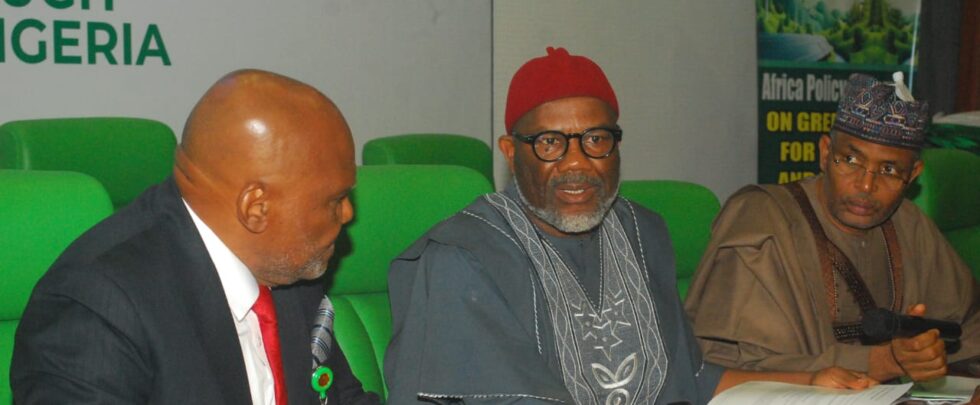*Say green jobs, low carbon emissions in workplaces are key to a sustainable future
JONAS EINCE, Abubas
House of Representatives Committee on Renewable Energy has said that Nigeria has 50 percent unmet needs in the Renewable Energy skilled labour sector.
The House Committee Chairman, Hon. AFAM Victor Ogene, stated this during the Africa Policy Dialogue workshop with theme: “Green jobs and low carbon transition,” held at the National Assembly in Abuja
Ogene said that the unmet needs had impeded the employment of quality technicians and employees in the sector.
“Today, nearly 50 per cent of skilled labour needs in Nigeria’s renewable sector remain unmet.
“Employers across the country consistently report difficulty hiring qualified technicians, engineers, and system operators,” he said.
He affirmed the gap in local equipment manufacturing, saying that most equipment used in renewable energy power generation was imported.
According to him, this potentially causes a loss of green job opportunities.
Ogene, however, said that this development was not as a result of a shortage of raw resources to locally manufacture, but because of the skill gaps and inadequate policies to ensure knowledge transfer.
He explained that the gap was not just a workforce problem, but a policy problem.
The Committee Chairman said that China, through its green job programme backed by Government policies and funding, had recorded an estimated total of over 7 million green jobs.
He called on Nigeria’s academic institutions to align with the energy transition’s demands.
Ogene, who reiterated the commitment of the legislature to improved Renewable Energy delivery, said that lawmakers recognized that crafting effective green jobs legislation for women and youth was imperative.
He explained that such meticulous work was required to ensure alignment with existing laws and potency in achieving their goals.
According to him, with my team of experienced colleagues, expert legal advisors, and skilled legislative drafters, we’re confident in delivering a comprehensive and impactful law the nation will be proud of.
The Speaker, House of Representatives, Rep. Obsirsaid that the dialogue was in accordance with the role of the 10th Assembly, which aligned directly with the broader oversight and legislative responsibility.
Represented by the Deputy Minority Whip, Hon. George Ozodinobi, Abbas affirmed the 10th National Assembly’s commitment to investigate policy gaps and propose solutions that were meaningful, realistic and impactful in addressing the challenge.
“Let me sincerely thank the Honourable Chairman and Members of the Committee on Renewable Energy for their diligence, foresight, and relentless effort in championing this important cause.
“As a responsible People’s House, we are fully aware of the strategic importance of green energy, not just because of its environmental significance but also due to its immense economic potential.”
Abbas said that the loud and urgent call for a just energy transition in Nigeria was a reflection of a dual reality.
According to him, our vulnerability to the impacts of climate change and our untapped renewable energy potential.
The Speaker restated the determination of the parliament to collaborate with relevant stakeholders in creating jobs to improving energy access, from preserving our ecosystems to reducing dependency on fossil fuels.
He expressed the imperatives of the legislative agenda as placing a strong emphasis on energy transition as a key pillar in tackling unemployment and environmental degradation.
He said that Nigeria was at a critical juncture where bold and deliberate policy choices could determine expected leap ahead into a sustainable future or remain stalled by outdated systems.
He called for urgent action to tap into renewable energy as a way forward in tackling youth unemployment and under-employment.
Also speaking, a representative of the INCLUDE Knowledge platform, Ms Victoria Manyaexpressed the platform’s belief in not just transition but increasing renewable energy skills in Africa.
Manya warned that the low-carbon transition risked becoming the handmaiden of fossil fuel interests—delivering decarbonization targets on paper.
“What we must do is reclaim the transition—not only as a climate imperative—but as a generational opportunity to rewrite our social contract.
“In Nigeria, the data is clear: too many young people are unemployed or underemployed, and too many women are shut out of emerging green sectors.”
She explained that “a just transition must not only ask how we reduce emissions, but who gets the new jobs, who trains the workforce, and who shapes the policies.”
Manya said that Nigeria stood at the same global threshold with bigger renewable energy nations, with a unique opportunity to lead Africa in embedding labour justice into climate action.
For a better society
_______________________________
Follow us across our platforms:
Instagram – https://www.instagram.com/championnewsonline/
Facebook – https://web.facebook.com/championnewsonline
LinkedIn – https://www.linkedin.com/company/champion-newspapers-limited/
https://x.com/championnewsng/
Facebook – https://web.facebook.com/championnewsonline
LinkedIn – https://www.linkedin.com/company/champion-newspapers-limited/
https://x.com/championnewsng/
You can also like and comment on our YouTube videos.
https://youtu.be/QIBfD1tT80w?si=R4Qf3so2LxYu3GC2














